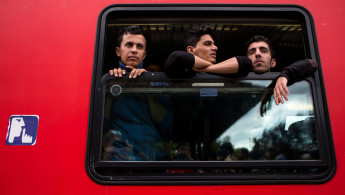Iraqis risk death on the long journey to Europe
Iraqis risk death on the long journey to Europe
Feature: The messages Iraqi refugees send back to their families after reaching Europe speak of hope for the future, and the dangers they faced on their journeys
3 min read
Iraqi migrants arriving in Germany on a train from Austria [AFP]
Ibrahim Abdul Rahman didn't tell his mother he was planning to emigrate to Europe when he left Iraq. He didn't want her to worry.
He told her he would travel to Turkey and apply for asylum at the UN office there.
Rahman had been kidnapped in his home country, with a ransom demand of $50,000. His family paid up, and Rahman left the country the next day.
From Turkey, it took Ibrahim three weeks to reach Belgium.
When he reached Brussels, he sent his mother a photo of him standing in Grand Place square, and the message: "Your prayer, mom, has landed me safely in Belgium."
Over the past decade, large numbers of Iraqis have left their country, headed for Europe, but the numbers of those who left seems to have increased over the past month, driven both by the dangers they face in their everyday life in Iraq and the promise of a better life in Europe.
In his letter to his parents, Omar Hadi wrote: "Sleep with your mind at ease, mom, and rest assured, dad, that I will be safe. I will start my life again in Germany. I promise you, dad, I will make you proud and you will see me a successful electronic engineer one day, as I promised you."
Risking death on his journey to Germany did not affect Hussam Rabea's humour.
He wrote home as soon as he entered Germany.
"I regret coming to a country where there's no action," he joked. "No militias, no killing, where electricity is available 24 hours a day. How will I cope with this life? I don't know."
After reaching Europe, Saeb Jaber wrote to his friends and asked them to carry a grim message to the relatives of his travelling companions, who drowned on the Mediterranean crossing.
"Hassan, Farqad and Salam drowned, and I was going to drown too because we didn't have life jackets or rescue equipment on the rubber boat we left Turkey in," he said.
"But I shared one of the survivor's lifebuoys and after two hours at sea, a commercial ship saved us and carried us to Greece."
Nashwan Faysal was one of a few survivors from a small boat that sunk after it was loaded to double its capacity.
He told al-Araby al-Jadeed he survived because he was a good swimmer and wore inflatable gear. But 23 other refugees died at sea that day, including women and children.
Nashwan collected their personal possessions when they washed up on the shore, including a doll that belonged to a girl named Rahaf. She had clung to it throughout her final journey.
Rahaf drowned with her parents. Nashwan recovered the doll and decided to keep it. It was, he said, "a message from the sea".
He told her he would travel to Turkey and apply for asylum at the UN office there.
Rahman had been kidnapped in his home country, with a ransom demand of $50,000. His family paid up, and Rahman left the country the next day.
From Turkey, it took Ibrahim three weeks to reach Belgium.
When he reached Brussels, he sent his mother a photo of him standing in Grand Place square, and the message: "Your prayer, mom, has landed me safely in Belgium."
Over the past decade, large numbers of Iraqis have left their country, headed for Europe, but the numbers of those who left seems to have increased over the past month, driven both by the dangers they face in their everyday life in Iraq and the promise of a better life in Europe.
In his letter to his parents, Omar Hadi wrote: "Sleep with your mind at ease, mom, and rest assured, dad, that I will be safe. I will start my life again in Germany. I promise you, dad, I will make you proud and you will see me a successful electronic engineer one day, as I promised you."
| I will be start my life again in Germany. I promise you, dad, I will make you proud - Iraqi emigrant Omar Hadi |
Risking death on his journey to Germany did not affect Hussam Rabea's humour.
He wrote home as soon as he entered Germany.
"I regret coming to a country where there's no action," he joked. "No militias, no killing, where electricity is available 24 hours a day. How will I cope with this life? I don't know."
After reaching Europe, Saeb Jaber wrote to his friends and asked them to carry a grim message to the relatives of his travelling companions, who drowned on the Mediterranean crossing.
"Hassan, Farqad and Salam drowned, and I was going to drown too because we didn't have life jackets or rescue equipment on the rubber boat we left Turkey in," he said.
"But I shared one of the survivor's lifebuoys and after two hours at sea, a commercial ship saved us and carried us to Greece."
Nashwan Faysal was one of a few survivors from a small boat that sunk after it was loaded to double its capacity.
He told al-Araby al-Jadeed he survived because he was a good swimmer and wore inflatable gear. But 23 other refugees died at sea that day, including women and children.
Nashwan collected their personal possessions when they washed up on the shore, including a doll that belonged to a girl named Rahaf. She had clung to it throughout her final journey.
Rahaf drowned with her parents. Nashwan recovered the doll and decided to keep it. It was, he said, "a message from the sea".



